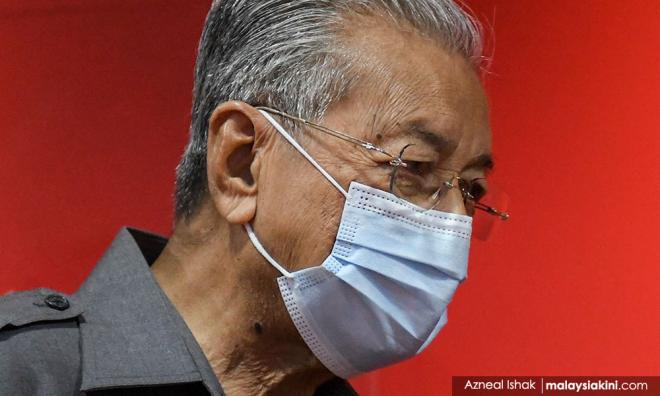
As more talk about the potential return of a Dr Mahathir Mohamad-led government, this will go well for all who wish for a return of the elected government that came into fruition on May 9, 2018. But before that happens, we have to be aware of the dangers that another Mahathir-led government would mean for everyday Malaysians – more worryingly another round of crony capitalism for the “elite few”.
This, of course, is not new. Mahathir’s first tenure as prime minister was characterised by “bumiputera capitalism” - the brutal genesis which culminated into the whole monster that was called 1MDB. Through himself, Daim Zainuddin and his protege Anwar Ibrahim, prior to Anwar’s downfall in September 1998, massive swathes of public assets were privatised including multi-billion projects such as the North-South Highway, water and sewerage, the Bakun dam, Light Rail Transit System and the National Train Service (KTM).
Looking back, these “wealth creation” only benefited the political elites that were tasked to oversee them and the corporate patrons that they used to create legitimacy - one of whom even tried to acquire Plus Expressways last year, no doubt at the behest of his political masters. While it did modernise Malaysia, it also contributed to the social and structural inequality that we see today. The Gini index for Malaysia (which measures inequality with 1 being the highest and 0 being the lowest) reached it’s highest during the pinnacle of Mahathir’s first regime at 0.49, and only subsided substantially during Abdullah Ahmad Badawi’s time onwards.
Are we ready to throw all the effort done at countering inequality away? When these bumi-capitalist companies inevitably failed, they were often bailed out. The only loser being the rakyat, who now have to deal with (and pay for a) myriad range of substandard and overpriced public infrastructure. In the short 22 months that was Pakatan Harapan, there were multiple signs of the rich getting richer.
A few months after the historic win, a letter of appointment that addressed Petron Fuel International Bhd as one of the fuel suppliers for government vehicles went viral on social media. One of Mahathir’s son, Mirzan Mahathir, is a director of Philippine-based Petron Corporation, which owns Petron Malaysia.
Just four days after Mahathir was sworn in as prime minister, Opcom Cables, a company engaged in the manufacturing and sale of fibre optic cables and cable-related products in Malaysia, was awarded an RM11.16 million contract by Telekom Malaysia. Mokhzani Mahathir was the chairperson and CEO of this Opcom Cables at that time, while his brother, Mukhriz (who is also Opcom’s co-founder), was the largest shareholder until he turned his shares over to his wife before entering politics.
On Aug 29, 2019, the shares of Opcom, rose 41.11 percent in a day. It should be noted that the government only recently approved the RM21.6 billion National Fiberisation and Connectivity Plan.
Mokhzani is also Malaysia’s 45th richest man according to Forbes' "2020 50 Richest Net Worth list" with a declared net worth of over US$305 million. Comparatively, more than half of the adult population in Malaysia have less than US$10 thousand in total wealth in 2019. While we are considered as an upper-middle-income country, one has to wonder how can the children of a prime minister, who earns a capped salary anyways, can amass so much wealth in one generation alone?
Unfortunately, the answer is obvious - and we are talking about a nonagenarian who constantly belittles the plight of the poor, insisting that they should work harder like his children. Especially the Malays have always been labelled as malas or lazy in simple English. Again with hindsight, could we blame anyone but ourselves at these recent turn of events?
Harapan was disappointing, let’s be clear – and no doubt had lost its bite in the days leading up to the Sheraton Move. Where were the warriors such as Nurul Izzah and Rafizi Ramli, both of whom commanded the admiration of the general rakyat? Let’s not forget it was Mahathir’s own choices that burdened us with individuals such as Redzuan Yusof and Rina Harun.
After all, it was the opposition (now Mahathir ally) leader Lim Kit Siang who stated that it was during Mahathir’s 22-year tenure as prime minister that Malaysia first began to “rot”, thanks to corruption and rampant power abuse. He pointed out that it was Mahathir who had “single-handedly destroyed the independence, impartiality and professionalism not only of the judiciary, but also of other important national institutions like the police, the Election Commission, the anti-corruption agency, and the civil service”.
Let that sink in. With a deliberately weak cabinet to do his bidding, it is not surprising that institutional reforms promised could not materialise. Many of us were duped into thinking that things will change when Harapan won the last general elections and thought that Mahathir is a changed man after all these years. So, if Pakatan actually gets back in government again, it must make sure that it is capable and willing to rein in the greater excesses of a Mahathir-led government, lest it finds itself in another political quagmire – one that the rakyat certainly are tired of.
But this is yet another story we’re all too familiar with. And now Mahathir is attacking his political opponents, specifically the Bersatu leaders who no longer support him by questioning their moral for working with “thieves” as allies. Please Tun, spare us this drama. The rakyat is already suffering from Covid-19 and its economic impact. We don’t need another political crisis on our hands. - Mkini



No comments:
Post a Comment
Note: Only a member of this blog may post a comment.